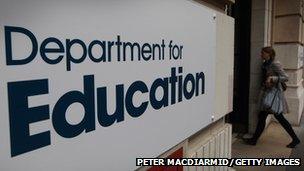Spending watchdog NAO warns on education accounts
- Published

The NAO 'qualified' the accounts
The government's spending watchdog has raised concerns about accounts from the Department for Education relating to its academy programme.
The National Audit Office has "qualified" its signing off of the department's accounts for last year because of "errors and uncertainties".
It says there are risks because the department is accountable for spending over which it has no direct control.
The Department for Education says it has made spending more transparent.
But it says it has noted the NAO's comments and will make more improvements.
The watchdog examines the accounts of all government departments every year.
The problems it has highlighted here, external relate to the bringing in of academy accounts to those of the Department for Education.
Academies are semi-independent but state-funded schools which have more control over their finances, staff pay and conditions and the school day than other maintained schools.
The government is encouraging all good schools to switch to become academies and where schools are said to be failing to improve, they can be turned in to academies too.
Nearly 3,000 academies were consolidated into the DfE's accounts during 2012-13.
'Continuing risks'
The NAO says part of the problem was that while the DfE finances operate in the normal financial year, ending in the spring, academies work to the academic year and produce accounts at the end of August.
To get around this problem, the NAO says the DfE and the Education Funding Agency (which channels the money for academies) "hypothesised" financial data for the year to the end of August 2012.
The NAO says it "identified a number of errors and uncertainties" in the way the EFA applied the new system and in the financial statements.
The other problem cited by the NAO was that the EFA made an assumption that all land and buildings used by academies should be assumed to belong to them and therefore be counted as assets in the DfE accounts, when in reality some are leased or belong to other bodies, such as religious groups in the case of faith schools.
Amyas Morse, NAO auditor general, said: "The consolidation of academy accounts was always going to be a complex and challenging task.
"It has demonstrated, however, key and continuing risks to the department's ability to exercise strategic financial management of the academy sector and to the sustainability of the department's current approach."
'Open government'
The Department for Education said it had been a huge task to consolidate the accounts, but it was an important step in giving people more information about government spending.
A spokesman said: "We are pleased that the NAO has signed off these accounts but at the same time we note their comments and are committed to improving the process further.
"Consolidating the accounts of more than 2,800 academies has been an enormous task - the only consolidation comparable in terms of size and complexity is the Whole of Government Accounts.
"It represents a significant step forward in transparency and open government. The public now have real clarity on the size and scale of the academy sector which is so critically important to the delivery of our educational goals."
The NAO "qualified" the accounts of six big government departments out of 17 last year, it says.
- Published17 July 2012